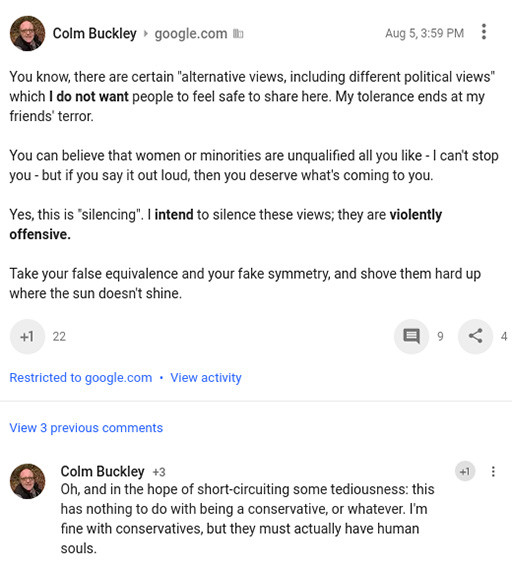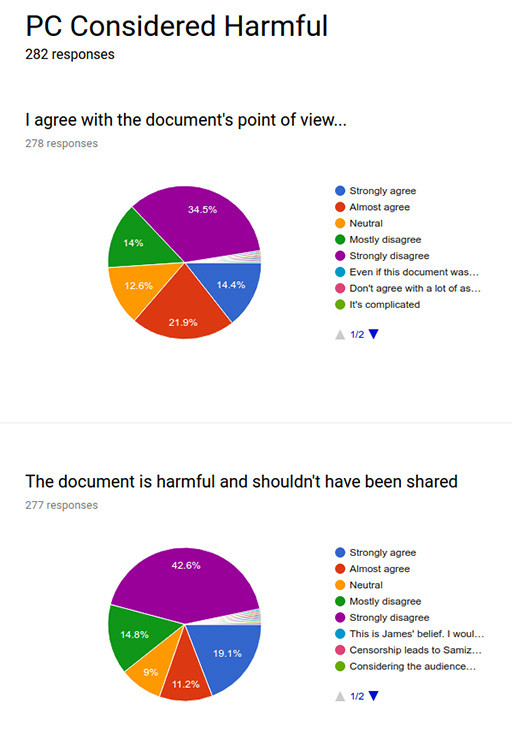A software engineer at Google recently wrote a document that circulated internally before it was leaked, where he argues that instead of programs that promote gender/racial diversity by discriminating against white men, the company should try to promote ideological diversity by pushing back against what he describes as a culture that punishes anyone outside the echo chamber. (Gizmodo apparently removed the references before publishing the document, lest the good people realizes that the author might have been onto something.) He points out that disparities between groups aren’t necessarily the result of discrimination, but could simply be the product of the fact that different groups have different interests. In particular, if women are underrepresented in technology, it may just be because they tend to be less interested in programming than men. Here is how the author of that document summarizes it:
- Google’s political bias has equated the freedom from offense with psychological safety, but shaming into silence is the antithesis of psychological safety.
- This silencing has created an ideological echo chamber where some ideas are too sacred to be honestly discussed.
- The lack of discussion fosters the most extreme and authoritarian elements of this ideology.
- Extreme: all disparities in representation are due to oppression
- Authoritarian: we should discriminate to correct for this oppression
- Differences in distributions of traits between men and women may in part explain why we don’t have 50% representation of women in tech and leadership. Discrimination to reach equal representation is unfair, divisive, and bad for business.
If you have been reading this blog for long enough, this will sound familiar to you, as I defended a similar explanation of the underrepresentation of women in philosophy and other male-dominated fields a few months ago. In my opinion, the guy is a bit careless in assuming that men/women psychological differences are innate (though it’s also worth keeping in mind that he wasn’t trying to write a scholarly article), but other than that, what he says is very sensible and measured.
As soon as this document started to circulate within the company, but even more after it leaked, the social justice warriors at Google and outside of it started to push back against it. Their reactions were a predictable combination of hysteria and stupidity, but as much as it was to be expected, I don’t think I will ever quite get used to it. What’s really striking, though again not surprising, is that while people emphatically claim the author of that document is wrong, they merely assert it but never engage with any of the arguments. In fact, whether through stupidity or dishonesty (it’s always hard to say and they are not mutually exclusive), they systematically misrepresent what he says. Someone leaked a few internal reactions to Vox Day, who shared them on his blog. To give you a sense of what they are like, here is just one of them.

Some employees of the company also took to Twitter in order to share their disgust and call for the guy who had the audacity to write this document to be fired.
Write a doc about how inferior women are, then try to be a hero by offering help to save the *vulnerable* 🤢🤢🤢 Still shaking in anger.
— Jaana B. Dogan 👀 (@rakyll) 4 août 2017
If HR does nothing in this case, I will consider leaving this company for real for the first time in five years.
— Jaana B. Dogan 👀 (@rakyll) 4 août 2017
So let me summarize the situation: a guy writes a document in which he warns that Google has a culture that silences people who dissent with the dominant ideology and, in response, people in the company vilify him and call for him to be sacked… The good news is that, if as Mr. Buckley and Ms. Dogan you are a retarded cry-baby with strong authoritarian tendencies, this is apparently not an insurmountable obstacle to a successful career at Google.
Fortunately, according to a poll of the company’s employees (also shared by Vox Day), there seems to be plenty of people at Google who agree with the author of that document or, at least, think that it’s important that he be able to express his views.
As I say in the title of this post (which was inspired by a tweet Charles Murray posted yesterday), the problem when you hire smart people is that, after a while, many of them see through your bullshit. But if you are a social justice warrior, don’t worry too much, you can count on Google’s high-level management to continue to promote the official narrative.
Why would Google be interested in hiring smart people per se (in the sense that you’re using “smart”, that is, people who see through bullshit)? Google’s goal is to make money, not to seek the truth or to cultivate intellectual excellence. You make money by telling as many people as possible what they want to hear, not by challenging their prejudices or unexamined beliefs.
Google, like other Silicon Valley giants and startups, are not just interested in making money. People up here buy into a vision pushed by a company, sometimes to the extent of not being an exaggeration to say someone drank the juice. It is widely thought here that these companies have the goal of changing the world for the better. The value system supporting that vision is not just bang in the bank.
I’m sure that they identify what’s good for humanity as what’s good for Google. They probably do it innocently and in good faith, but I’d prefer that the basic goal of people with the capacity to read all my emails was profits rather than that strange mixture of beneficence and profit-seeking that I imagine characterizes Google.
The comments against this guy on the gizmodo link are enlightening (and kind of frightening). The dominant mindset in the west has now become a servant to the new scholasticism of progressive ideology.
I’d like this anonymous survey to be extended (to be more representative). It is interesting to see the difference between such surveys and what people feel comfortable sharing publicly.
Reminds me of Timur Kuran’s book.
Scott Alexander (whom you also refer to in your other post ) wrote this gem of an analysis on the issue, extending it to the general discussion of biological gender differences and their implications for interpreting unequal gender proportions in different jobs.